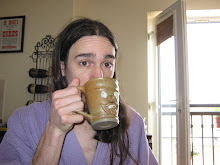Recital Preparations
As some of you may know, my Master's Recital is next Thursday. With a little over a week to go, I would normally be panicking about finding a pianist. Luckily this time, the school has supplied one, and we've rehearsed and performed a bit together already. The school may not be high on the organization list, but they were spot-on this time.
There are three pieces on the program, totaling about 40 minutes of music; RNCM has a limit, and the recitals are put on like a factory: specific, 45-minute slots with 15 minutes between recitals. Music must be given to the attendant 20 min. prior to playing (so they can be given to adjudicators). blah, blah, blah.
On the program: Three movements from Bach D Minor. I wanted to do another suite, but Steve thought my prior experience with this could be bolstered by another performance (although a whole suite would take too much % of the program, especially if one of the judges is anti-transcriptions). I settled on the Prelude, Courante, and Gigue, primarily to contrast with the 2nd piece.
Next, John Golland's 2nd Euphonium Concerto (yes, he wrote 2!), 2nd Movement. This is generally regarded as one of the greatest slow pieces ever written for euphonium. When performed properly, it can be absolutely transcendent; but the difficulty lies in not completely messing up after getting everyone on Cloud 9).
Finally, Elgar Howarth's "Stories for Saroyan". Howarth was raised in a brass band culture, but has been none primarily as an operatic conductor. His music is steeped in intellectual pondering, but lies on a deep, gripping aesthetic as well (people who have attended personal recitals know how this line between intellectual and aesthetic interests me).
"Stories" is a tribute to William Saroyan, the Armenian-American writer (whose work I am sadly unfamiliar with); however, it isn't generated as most tributes would be. Composers wishing to honour a writer would more than likely simply "recreate" the stories, either through direct imitation, or through a more casual, over-arching view.
Howarth, however, takes a different approach: The stories are about himself! Instead of saying "here's my interpretation of a story by Saroyan", he's saying "Saroyan, here's a story I've written for you. It's about my life, it's about the people I've known and loved throughout my life. "
There are 8 stories, a Cadenza (which is simply a review of the tales), and a Coda, aptly named "Hello Out There" (There's the tribute to Saroyan, and an acknowledgement to the audience) The music is ridiculous, at least if you're trying to play it in tempo with a piano (musicians, think of a piano alternating between 4/4 and 12/8 with the euphonium in 5, non-musicians think about talking to a friend while listening to the radio and reading a newspaper, and knowing exactly what's going on). But the moments when everything comes together, those are what we wait for.


3 Comments:
I'm truly excited about hearing you play this programme and I absolutely agree about the Golland, which you clearly play perfectly, because I certainly had the transcendent experience when I heard you play it a week ago. Excellent choice!
your recitals sound more like juries to me...and I thought our recitals at rice were "factory" since we don't get to take an intermission...but good luck!!!
Good luck!
(Or is it "congratulations"? Did you mean Thursday as in a half-week ago or as in a half-week from now?
Post a Comment
<< Home